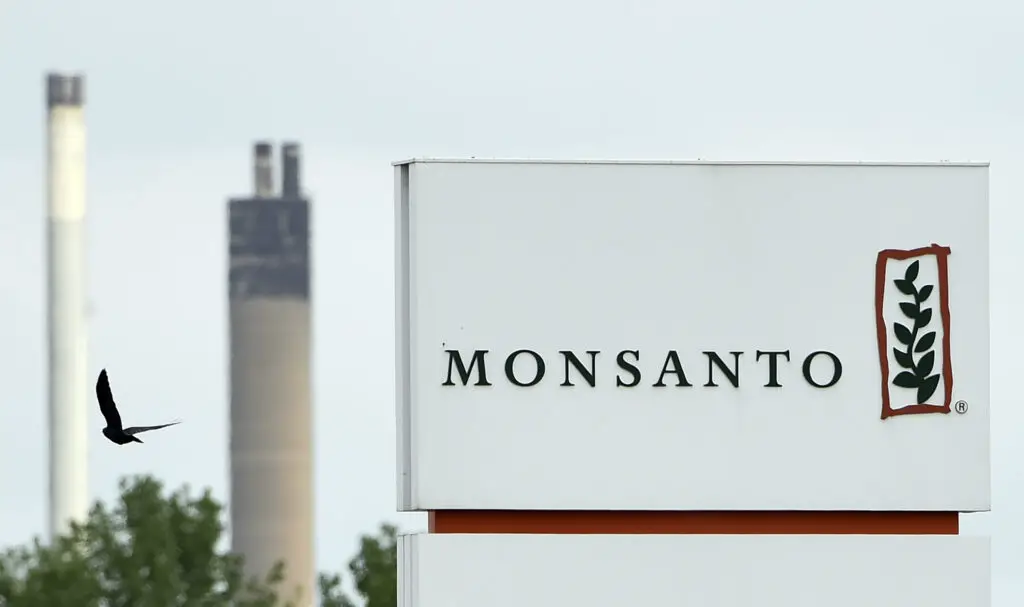Bayer, the new owner of the infamous Monsanto, is facing similar criticism over GMOs as did its predecessor.
This most recent reaction comes from South Africa, where critics are again pointing accusing fingers at the giant producers of Genetic Modified Organisms (GMOs).
According to green activists Greenpeace, Bayer, the company that bought Monsanto, is still distributing the weed killer glyphosate under the brand name Roundup.
Greenpeace alleges that ‘glyphosate has also been deemed a probable carcinogen by WHO…long-term exposure increases your chances of contracting non-Hodgkin’s lymphoma, a type of cancer, by 41%.’
Defenders of GMOs maintain that genetically modified organisms, be they animals or plants, can help solve food insecurity not only in Africa but the world at large.
However, activists are not buying it, just as the case is for South Africa, critics of GMOs in Kenya also want GMOs out of their markets, and if they should be sold in the country, then they want the decision to be inclusive, and right now they don’t feel included.
The most recent tongue-wagging was towards none other than the recently elected President of Kenya William Ruto who lifted the country’s ban on GMO products in Kenya.
Kenyans want the decision to have or lift a ban on GMOs to be made through public consultation, and right now they accuse Kenya’s Cabinet of lifting the ban without any public consultation.
It gets worse; activists in Kenya allege a conspiracy surrounding the US influence in Kenyan politics, arguing that Ruto’s administration only lifted the ban to appease US stakeholders.
- GMOs critics allege Kenya reversed ban on GMOs without public consultation
- Monsanto defend GMOs as necessary for global food security
- Researchers in Tanzania working on various crop and animal GM products
From South Africa, we came up to East Africa, now, let us go across the continent to Nigeria, where we find similar criticism against GMOs.
Here, research by the Health of Mother Earth Foundation (HOMEF) reports that GMOs can be readily found in any open-air market, making them difficult to identify against the organic versions. Nigerian activists argue that when grains, say maize or beans, are placed on display in a crowded, busy African market, the consumer cannot differentiate them from organic varieties.
While laws governing the sale and publicity of GMOs require clear labelling, the African open-air market setting is not consumer friendly especially when it comes to labelling grains and meat.
Also Read: Africa’s readiness for GMOs amid food security concerns
Four years ago, in 2018, Bayer purchased the World’s largest GMO producer Monsanto for US$63 billion. With that buy, Bayer became the second-largest agrochemical company in the world.
To date, Bayer is said to own at least 33% of the global seed market and 23% of the agrochemical market. From a chemical production company, Monsanto morphed into a seed-producing company, and up to its buyout, it also produced a global top-selling herbicide called Roundup (glyphosate).
The herbicide is sold as a weed killer, and it is what the South African activists are protesting against the backdrop of research by the World Health Organisation (WHO) that revealed Roundup (glyphosate) could cause certain types of cancers upon prolonged exposure.
Does the weedkiller ‘Roundup’ glyphosate cause cancer?
A CNN report of 2019 titled: ‘Common weed killer glyphosate increases cancer risk by 41%, study says it was reported that: “Glyphosate, a herbicide that remains the world’s most ubiquitous weed killer, raises the cancer risk of those exposed to it by 41%, a new analysis says.
The report quoted researchers from the University of Washington whose studies found that weed killers (including Monsanto’s Roundup) significantly increase the risk of cancer of the immune system called non-Hodgkin lymphoma (NHL).
Worse still, scientists around the world are calling for a reassessment of products that contain glyphosate, including the weedkiller Roundup. Studies show that exposure to glyphosate does have negative health effects on humans and animals as well.
Health risks include: 1
- Birth defects in the Argentinean state of Chaco, where GM soya and rice crops are heavily sprayed with glyphosate, increased nearly fourfold over the years 2000 to 2009. Similar defects were also found in woman from Paraguay exposed to glyphosate-based herbicides during pregnancy. These defects were compatible with those induced in laboratory experiments at much lower concentrations than normal commercial glyphosate concentrations.
- Glyphosate is a suspected endocrine disruptor. This means it could disrupt the production of vital reproductive hormones, such as progesterone and oestrogen. Published studies demonstrate various endocrine effects in animals and human cells associated with glyphosate.
- Studies of illness patterns in human populations (epidemiological studies) have linked glyphosate exposure to non-Hodgkin’s lymphoma (a type of blood cancer), whilst laboratory studies have confirmed that glyphosate and/or its associated products exhibit characteristics typical of cancer-causing agents (i.e. genotoxicity or mutagenicity) in animals and both human and animal. Together, these studies suggest that glyphosate may contribute to cancer. Evidence that glyphosate may also affect the nervous system and may even be implicated in Parkinson’s disease.
Health risks source: cban.ca/gmos/issues/monsanto/ 1
Also Read: GMOs ban lifting: the future of Kenya’s indigenous seeds
In 2020, the Center for Food Safety (CFS) in the US won a major legal battle against just such herbicides and pesticides right along with GMO crops.
The win did not come easy. It was the result of years of litigation against Monsanto’s toxic pesticide, in this case, called dicamba, before a federal court issued the ruling. The win was a double-edged sword in that it banned the pesticide and it also banned the use of GMO crops that were designed to withstand the effects of the said pesticide.
In the ruling, the US Ninth Circuit Court of Appeals ordered that EPA’s approval of the pesticide in question be revoked with immediate effect and application also stopped. The reason farmers took the GMOs and the related pesticides to court in the first place is the same reason the South African activists are decrying the sale of the weed killer there; it simply is not safe for humans, animals and crops as well.
In its ruling, the US Ninth Circuit Court of Appeals said the pesticide’s approval was actually unlawful, and that it caused “enormous and unprecedented damage” that has “torn apart the social fabric of many farming communities.”
It is just such a ruling that activists in South Africa, Kenya and Nigeria, to mention but a few countries where activists are fighting to attain.
Much remains to be decided when it comes to GMOs, which is a sad fact given such rulings that have already passed. Critics say GMOs are not meant to bring about food security but to earn trillions of profit for a handful of wealthy individuals who own the companies that produce the GMOs.











